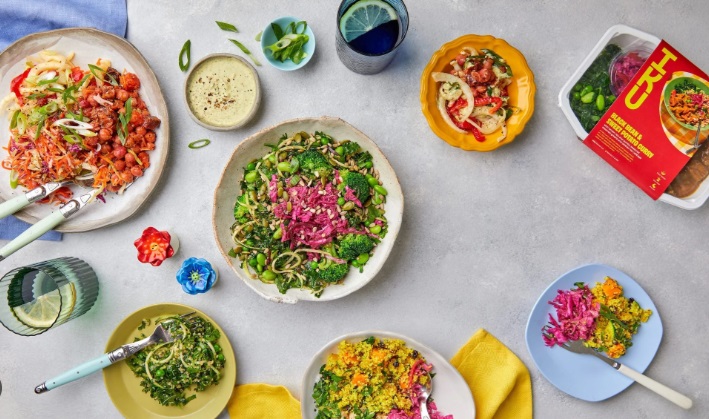
Many people with a history of early childhood trauma – such as attachment trauma, complex trauma, or developmental trauma – are also highly sensitive individuals. For some, this sensitivity extends to a deep empathy for animals and the environment, leading them to choose a plant-based lifestyle. Unfortunately, this choice is often misunderstood or even pathologised in some mental health arenas, especially in eating disorder settings.
However, it is entirely possible to meet all nutritional needs through a well-planned, whole food, plant-based diet. Whilst home-cooked meals are often the most nutritious, plant-based cooking can also be time-consuming – especially for those managing work, family, therapy, and the emotional labour of healing.
For those in trauma or disordered eating recovery, food can become a powerful part of the healing process – supporting the body, regulating the nervous system, and aligning with deeply held values. Below are five highly regarded plant-based meal delivery services that offer nourishment, convenience, and care for those on their road to recovery.
NB: Some of the meal plans contain food label information which may not be suitable for those in early recovery from an eating disorder.
Meal Plan 1: Garden of Goodness – Simple, Nourishing, and Convenient
Recommended by Karen Bieman – Deceptive Sexuality & Trauma Coach, PACFA Registered Clinical Counsellor & Psychotherapist.
During a particularly full-on period of client work and study, I needed something that could support my health without adding to the mental load. That’s when I tried Garden of Goodness – a weekly delivery of organic, plant-based meals, made locally with a clear commitment to both human and planetary wellbeing.
The menu offered plenty of variety: scrambled tofu breakfasts, shakshuka, lots of delicious soups, Asian noodle salads, lentil Bolognese, even loaded nachos. The meals were wholesome, flavourful, and aligned with the way I eat.
I chose it because everything was ready to go – no chopping, cooking or cleaning required. As someone now cooking for one, I appreciated not having to start from scratch every night. It was also a gentle form of self-care: eating well without having to think too much about it.
The plant-based meals worked perfectly with a few quick veggies in the air fryer. I’d often set the timer to finish around the same time I would end with clients, and by the time I logged off, dinner was ready in under 10 minutes.
Yes, it’s a bit of an investment, but I made it work by ordering the larger meal sizes and spreading them over two nights. My first delivery was actually a thoughtful gift from my mum – a small gesture that made a big difference in a busy week.
If you’re on the NDIS, Garden of Goodness is also an approved provider – a helpful option if you’re looking for simple, nutritious meals that fit with your support plan.
Meal Plan 2: Soulara – Variety, Flexibility and Compassionate Eating
Recommended by Counsellor and Mental Health Social Worker, Janeth Scruggs. Janet has been vegetarian for 30 years.
Soulara is a popular Australian plant-based meal delivery service offering fresh, chef-crafted meals made without animal products. Their menu is entirely vegan and rotates regularly, with a strong focus on whole food ingredients and globally inspired flavours. Meals arrive fresh (not frozen), are portion-controlled, and require no prep beyond reheating – perfect for those with limited time or energy.
Janeth enjoys the wide range of options Soulara offers. As someone who often batch cooks to get through the work week, she appreciates not having to eat the same thing four nights in a row. With Soulara, she can choose what she feels like each day and keep extra meals in the freezer for those times when cooking feels like too much. “It’s so much better than relying on Uber Eats,” she says. Some of the options include the roasted pumpkin penne, root vegetable curry, teriyaki bowls, satay, and lentil shepherd’s pie.
Meal Plan 3: IKU – Eating Well, Simply and Compassionately
Recommended by PACFA Certified Practising Counsellor, Robyn Bean & Registered PACFA Counsellor Von Coves.
IKU has always been a celebration of eating well to live well. Their philosophy centres on using ingredients from nature to create simple, macrobiotic meals that nurture the body without doing harm to you or the earth. From chia seed pudding and big breakfasts to eggplant moussaka and delicious puddings and snacks, IKU’s meals bring balance and vitality in every bite.
Robyn Bean knows this well. “They’re the best out of everything I’ve ordered over the years, always fresh despite being in hot and somewhat distant Brisbane,” she says. Robyn first encountered vegetarianism about thirty years ago through a yoga group and Indian friends – a way of eating that felt intuitively right. Over time, she’s moved through omnivorous and vegetarian phases, but now identifies most closely with a “plant-based” lifestyle.
Robyn lives with several serious food allergies, including to quinoa – a common vegan ingredient – and also has Pollen-Food Allergy Syndrome, which means many raw vegetables are off limits. “Most people are unfamiliar with this condition and it’s certainly not easy to explain to a waiter or a host,” she explains. “So if there’s nothing suitable available, I’m kind to myself by choosing something more ‘flexitarian’ to eat.”
Growing up on a farm taught Robyn a valuable lesson: no matter how carefully she chooses her food, it’s impossible to completely avoid harm – even if indirect. “I try not to treat vegetarianism as moral perfectionism, but as a path of harm minimisation and compassion for all beings – including me. We can only do our best.”
Von Coves echoes this practical, compassionate approach. “I love having IKU delivered! I think you might like it because, unlike most meal services, it doesn’t involve any meal prep. It’s high quality and the flavours are interesting. I used to love cooking, but I’m just too busy these days. It’s the food I would make if I had all day to chop vegetables! To bump up protein, I sometimes add a boiled egg or nuts.”
For those seeking nourishing meals that fit real life – balancing health, convenience, and care for the planet -IKU offers a thoughtful, reliable choice.
Other Plant-Based Options to Explore
Recommended by Jodie Gale (Blog Author), Registered Clinical Psychotherapist. Vegetarian & Vegan Nutritionist. Vegetarian, Vegan & Plant-Based since 1991.
Two other options worth mentioning are Vegan Soul and Hello Fresh.
I haven’t personally used Vegan Soul, but I’ve read wonderful reviews. Their soul food–inspired vegan meals are said to be both comforting and deeply nourishing – perfect for those seeking flavour, convenience, and alignment with compassionate living.
Hello Fresh, on the other hand, has been a staple in my own home. As someone who’s moved inbetween vegetarian, vegan & plant-based for more than 35 years, I’ve often relied on Hello Fresh at the start of each school term to make life a little easier. In a family where not everyone is plant-based, it’s been a great solution – my husband can cook meat-based meals for himself and the kids, and I can choose from a wide range of vegetarian and plant-based options for myself. Some of my favourites include Mediterranean Chickpea-Stuffed Capsicums, Lentil Coconut Dahl, and Black Bean & Veggie Quesadillas.
After years of being pathologised in treatment centres – some even saying, “You won’t recover if you don’t eat meat” – I decided to formally study vegetarian and vegan nutrition to better support my clients. In my work, I always explore with clients: Which parts are choosing not to harm themselves or others? And which parts may be influenced by the eating disorder? Together, we gently tease these apart.
Choosing a plant-based lifestyle can be part of healing – not a hindrance to it. For many trauma and disordered eating survivors, it’s a meaningful and values-aligned step toward nourishment, empowerment, and recovery.

Leave a Reply